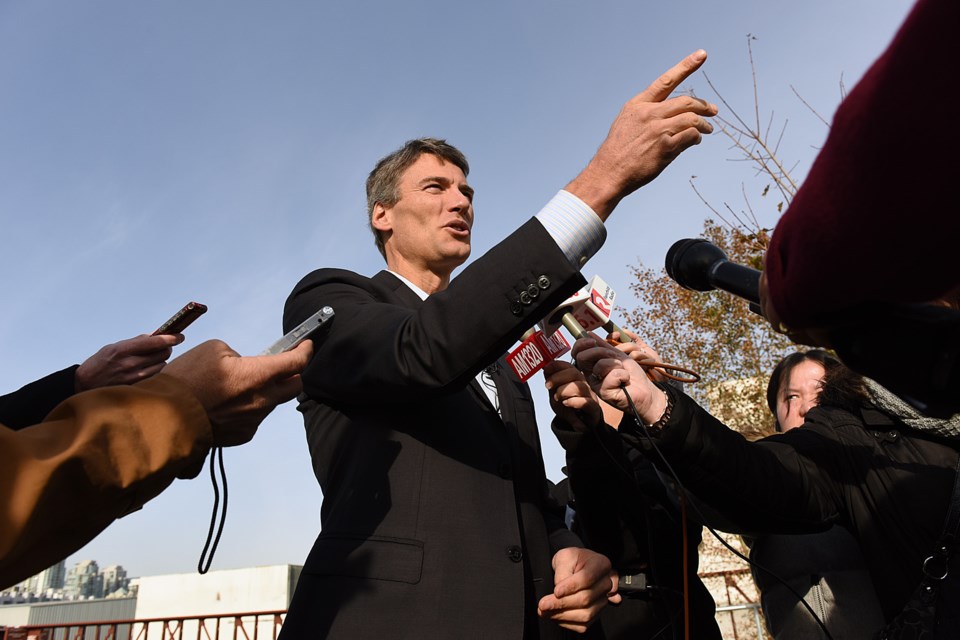Having secured his re-election bid Saturday night, Mayor Gregor Robertson is now putting energy into his campaign to urge Metro Vancouver voters to cast a ballot for one of his biggest priorities: a Broadway subway.
Robertson told reporters Monday that a winning vote in next spring’s transit referendum would send a message to senior levels of government that a subway is needed along the Broadway corridor.
“We need a strong positive vote for that,” he said, standing on a piece of land off Great Northern Way that would serve as part of the subway’s route. “That’ll send the signal that we’re ready to roll here and we need those big investments overall from the federal and provincial governments, along with the operating funding to run the new system.”
Robertson’s pitch for the subway is not new and, as he did during his re-election bid, he continues to answer questions about whether senior levels of government are prepared to pay for the $1.9-billion system.
His main challenger in the mayoral race, Kirk LaPointe, repeatedly criticized him in debates, saying he was being disingenuous in his campaign to get a subway since he had no funding commitments from ministers in Victoria or Ottawa.
“My sense is, as their budgets go into the black and the capital [money] comes available, that those commitments are going to come forward,” the mayor said in response to the question of funding.
Back in June, Robertson and mayors from around the region approved a 10-year transit plan that will cost $7.5 billion and include the construction of the 5.1-kilometre subway line from the VCC-Clark SkyTrain station to Arbutus.
The plan relies on $3.9 billion from senior levels of government and funding mechanisms such as reallocating $250 million per year of the provincial government’s carbon tax, bridge tolls and possibly charging vehicle drivers for the distance they drive.
Transportation Minister Todd Stone has, so far, balked at the carbon tax request and said any new funding for transit must be decided in a referendum, which will occur sometime in the spring.
Ironically, Robertson and the mayors’ council on regional transportation went on record in June 2013 of opposing a referendum, saying government should commit to the transit plan like it did to building a new Port Mann Bridge and widening the TransCanada Highway.
The provincial government continues to work on a question for the referendum and date for the vote, which would only be open to Metro Vancouver voters. Details could be revealed next month.
The transit plan also calls for a $2.1-billion light-rail system in Surrey, where that city’s new mayor, Linda Hepner, promised to get a first phase of light rail built by 2018, if the referendum fails. (Hepner has not said specifically how a system would be built without funding from senior levels of government but suggested a private partnership).
Asked whether he had a Plan B, Robertson said he would look at one if the referendum fails.
“At this point, all of my efforts are going into winning this referendum and making sure that it is approved and that we have a regional focus with our transportation improvements.”
Robertson was re-elected Saturday along with six incumbent councillors. Vision Coun. Tony Tang lost his seat, reducing Vision’s majority to seven, with the NPA re-electing incumbents George Affleck and Elizabeth Ball, and former park board commissioner Melissa De Genova. Green Party Coun. Adriane Carr was re-elected, topping the council polls.
Vision’s reduced majority means it will have to convince at least one of the four opposition councillors to be on side when eight required votes are needed to rescind a resolution or approve money grants to non-profits and community groups.
“I’m anticipating that most, if not all of those votes, will take place with consensus,” Robertson said. “Historically, council has supported all of the grants that get made, almost unanimously.”
Robertson and his new council will be inaugurated in the first week of December. If the mayor completes his third term, he will be the longest serving mayor in modern times, with Louis D. Taylor serving 10 years between 1924 and 1934.
Voter turnout this election, at 44 per cent, was the highest since 2002, when it was 50 per cent and COPE won the mayor’s chair, council, school board and park board. COPE didn’t win any seats this time.
twitter.com/Howellings



